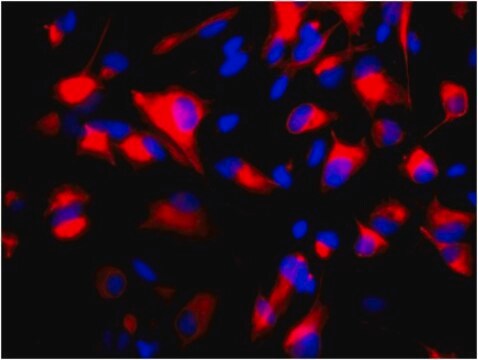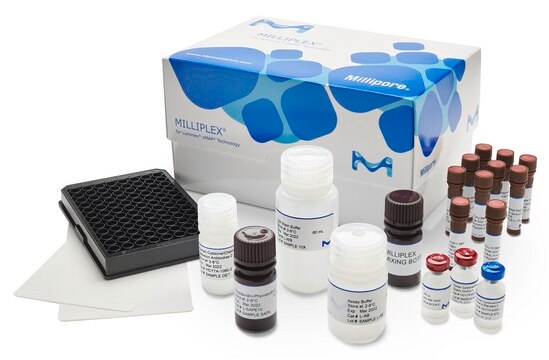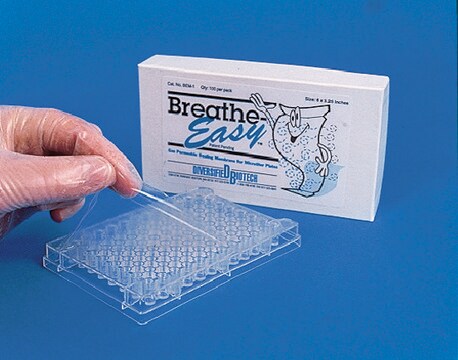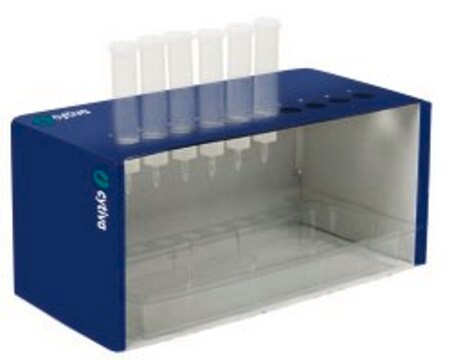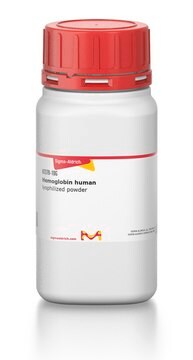MABC166
Anti-Angiogenin Antibody, clone 26–2F (Azide Free)
clone 26-2F, from mouse
Synonyme(s) :
Angiogenin, Ribonuclease 5, RNase 5
About This Item
Produits recommandés
Source biologique
mouse
Niveau de qualité
Forme d'anticorps
purified antibody
Type de produit anticorps
primary antibodies
Clone
26-2F, monoclonal
Espèces réactives
human
Technique(s)
immunocytochemistry: suitable
immunohistochemistry: suitable
inhibition assay: suitable
Isotype
IgG1κ
Numéro d'accès NCBI
Numéro d'accès UniProt
Conditions d'expédition
wet ice
Modification post-traductionnelle de la cible
unmodified
Informations sur le gène
human ... ANG(283)
Description générale
Immunogène
Application
Inhibition Assay: A representative lot of this antibody inhibited ribonucleolytic activity (Piccoli et al., (1998) Proc. Natl. Acad. Sci. 95:4579–4583).
Immunohistochemistry Analysis: A representative lot of this antibody detected Angiogenin in Neovessels of cancer tissue (Tsuji et al., (2005) Cancer Res. 65:1352-1360).
Immunocytochemistry Analysis: A representative lot of this antibody detected Angiogenin in HeLa and Huvec cells (Tsuji et al., (2005) Cancer Res. 65:1352-1360).
Apoptosis & Cancer
Apoptosis - Additional
Qualité
Immunocytochemistry Analysis: A 4 µg/mL of this antibody detected Angiogenin in Angiogenin-treated and untreated HeLa Cells. HeLa cells that were treated with Angiogenin up-took the protein and translocated it to the nucleus. Untreated HeLa cells did not exhibit any Angiogenin protein signal.
Description de la cible
Forme physique
Stockage et stabilité
Handling Recommendations: Upon receipt and prior to removing the cap, centrifuge the vial and gently mix the solution. Aliquot into microcentrifuge tubes and store at -20°C. Avoid repeated freeze/thaw cycles, which may damage IgG and affect product performance.
Autres remarques
Clause de non-responsabilité
Vous ne trouvez pas le bon produit ?
Essayez notre Outil de sélection de produits.
Code de la classe de stockage
12 - Non Combustible Liquids
Classe de danger pour l'eau (WGK)
WGK 2
Point d'éclair (°F)
Not applicable
Point d'éclair (°C)
Not applicable
Certificats d'analyse (COA)
Recherchez un Certificats d'analyse (COA) en saisissant le numéro de lot du produit. Les numéros de lot figurent sur l'étiquette du produit après les mots "Lot" ou "Batch".
Déjà en possession de ce produit ?
Retrouvez la documentation relative aux produits que vous avez récemment achetés dans la Bibliothèque de documents.
Notre équipe de scientifiques dispose d'une expérience dans tous les secteurs de la recherche, notamment en sciences de la vie, science des matériaux, synthèse chimique, chromatographie, analyse et dans de nombreux autres domaines..
Contacter notre Service technique